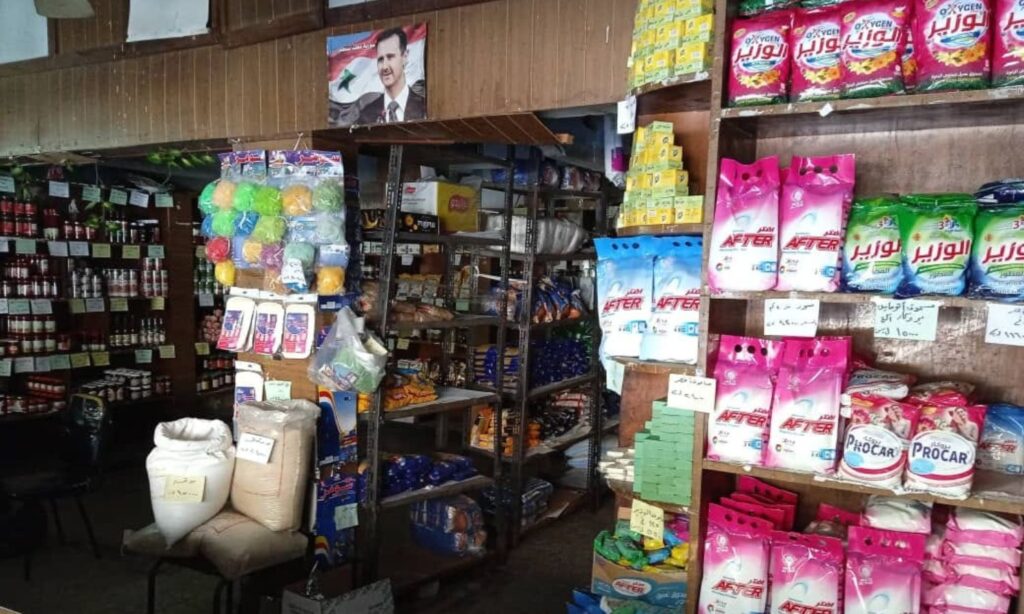The prices of most goods in the city of Latakia on the Syrian coast have risen by 60% to 100%, without regulation.
The city is experiencing crowding and an increase in demand for food products, coinciding with military operations carried out by opposition factions that control cities and towns.
According to a monitoring report by Enab Baladi on the prices of some goods in Latakia, the price of a pack of ghee (two kilograms) rose from 70,000 Syrian pounds to 100,000 (5.2 USD), and a liter of frying oil from 27,000 to 50,000.
The price of a kilo of sugar increased from 12,500 pounds to 20,000, a kilo of bulgur from 14,000 to 22,000, and a pack of pasta from 15,000 to 20,000, with price variations between different shops.
Reham, residing in Latakia, was surprised by the congestion in commercial stores, describing prices as “crazy” over the past three days. She mentioned that residents are preparing for days when food and ration materials may be scarce.
She added to Enab Baladi that she could not purchase more food items than her family’s usual needs (three individuals) because stockpiling, even for a couple of weeks, is limited to those with financial capacity.
Reham pointed out a noticeable price disparity between shops, with no clear justification, some related to the depreciation of the Syrian pound against the dollar, and others due to scarcity of quantities.
The exchange rate of the Syrian pound against the dollar has fallen unprecedentedly in recent days, with expectations of continued decline, as every 19,000 Syrian pounds equals one US dollar.
The situation in Latakia is similar to other areas, including the capital Damascus, where demand has increased, and some stores have run out of goods. This is amid statements from the regime’s Ministry of Internal Trade, asserting that food products are available in the markets and there is no shortage of any commodity.
The ministry denies
The rising prices contradict the statements of the regime’s Ministry of Internal Trade and Consumer Protection, which said on December 2 that food products are available in the markets and there is no shortage or hoarding of any commodity due to prevailing conditions, according to local radio Sham FM.
It stated that markets are stable, with essential goods available despite a noticeable increase in prices, noting that it will monitor and oversee the activities of producers and merchants (importers, producers, wholesale, and retail) on an ongoing daily basis to achieve price stability and prevent any hoarding or congestion of any goods.
It added that consumer protection patrols have been deployed in all primary and secondary markets to control any increase in prices or hoarding of goods, and called on the public not to succumb to any rumors.
The prices of goods are high compared to the living and economic conditions of residents, where the minimum government salary is 279,000 Syrian pounds (14.5 USD).
In October, a statistic conducted by the Central Bureau of Statistics in Syria showed that a large number of Syrian families are managing with only one meal a day due to the significant decline in living and economic conditions.
Syria is witnessing military operations in various regions, notably “Deterrence of Aggression,” launched by opposition factions against the Syrian regime’s forces and their allies on November 27. Through this operation, they have taken control of the cities of Aleppo and Hama and dozens of villages and towns, reaching the outskirts of the city of Homs.
The Syrian National Army (SNA), supported by Turkey, is carrying out “Dawn of Freedom” operations in northern and eastern Aleppo against the Syrian Democratic Forces (SDF) and the regime, while local factions in Daraa, As-Suwayda, and Quneitra have also moved against the regime’s forces.

